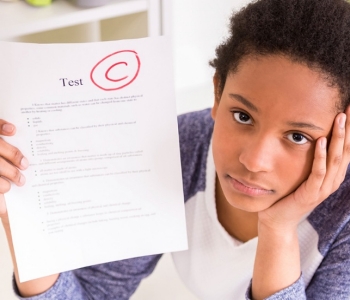The Real Problem With Parents in the Lunchroom

When it comes to the lunchroom, most schools’ rules are pretty much the same—stay in line, no soda or candy, and definitely no food fights. But some schools have had to implement a new rule this year, one that’s causing controversy and ringing a few alarm bells: no parents in the lunchroom.
Some dads and moms say they’re just following suggestions to be more involved at school and don’t understand why this opportunity for quality time with their kids has been taken away from them. But the truth is, although parents may have the best intentions, their presence in the lunchroom can actually be detrimental to their child’s development.
“This is a classic example of what we call ‘Velcro parenting,’ where adult family members feel the need to be constantly attached to their children,” says Girl Scouts’ developmental psychologist Dr. Andrea Bastiani Archibald. “Parents may think joining their child for lunch is a great bonding opportunity, but the underlying motivations can include wanting their child to consider them more as a friend than an authority figure, hoping to secure their child’s social status in school by bringing in special food or treats for other kids, and even wanting to be present to help their child avoid anything that could go wrong socially at the lunch hour.”
All of these inclinations come from a loving place, says Dr. Bastiani Archibald, but what none of them take into account is just how valuable and enriching the lunch hour is as a parent-free zone—and what their child could be missing out on when they inject themselves into that space. Schools are engineered with learning in mind, both in the classroom and (believe it or not) in the lunchroom.
The cafeteria is a microcosm of the real world, where your girl can test her independence, explore her personality, learn about others, and navigate the social landscape. “Sometimes she’ll be successful, and sometimes she won’t,” Dr. Bastiani Archibald says, “But if her parent is there, watching her every interaction, or even keeping her separate from the larger group, she’s missing out on rich opportunities to grow.”
Plus, parental presence can ostracize your girl from other kids, weaken her confidence in her own abilities, and put the brakes on her path to maturity and independence.
So what’s a recently banned lunch-buddy parent to do? “Instead of being by your girl’s side at the lunch table, make sure you’re asking about what goes on at lunch hour,” advises Dr. Bastiani Archibald. “Find out who she’s sitting with, who sits alone, who makes the funniest jokes, what everyone’s talking about, and what her favorite game to play is. Go beyond asking about homework and really get to know about her friends, the fun she’s having, and even the drama on the playground.”
Listening to her responses, seeing how she interprets different events, and learning how she dealt with different situations will give you a window into her world like no other. Seeing the lunchroom for yourself is one thing, but nothing will bring you closer or help you understand her more than seeing it through her eyes.





